Podcast: Download (Duration: 50:35 — 46.5MB)
Get Notified Of Future Episodes Apple Podcasts | Spotify | Amazon Music | Android | Blubrry | Gaana | TuneIn | Deezer | Anghami | RSS | More
Episode topics:
01:49 – The need for key agreements
03:20 – Agreements you should have
05:19 – If your business is online
07:29 – Why you shouldn’t just cut and paste
10:26 – When it comes to affiliate marketing…
13:52 – READ those clauses
16:40 – The subject of partnership agreements
22:01 – A quick review
24:35 – In matters of disputes
27:18 – Choosing your lawyer
32:13 – When emotions get in the way
36:26 – Improving your cash flow
40:43 – Look out for these things
42:21 – You need to communicate
45:33 – Being the first to get paid
James will coach you. Membership is opening soon – click HERE
Part 1 of the series
Part 3 of the series
Transcription:
James: James Schramko here, welcome back to SuperFastBusiness.com. This is actually Part 2 of a three-part series called Are You Legal?, where I have my special guest Joanna Oakey from AspectLegal.com.au. Welcome back.
Joanna: Thanks, James.
James: Now if you haven’t listened to the first part of this series, you want to go back and listen to Are You Legal Part 1, which is where we were talking about having the right structure, setting the foundations, protecting your intellectual property, staffing, and how to protect yourself from potential risks there.
And that leads us into Part 2. In this episode, we’re going to be talking about the key agreements that you need to have in place for your business. We’ll talk about disputes and contracts. We’ll also talk about having some systems for cash flow. Also, you might look at that as a debt collection idea.
When we get into Part 3, we’re going to be talking about building your business to sell. But we’re not there yet.
So let’s start off with key agreements. Let’s talk about why we need to have key agreements in a business. We can’t just make stuff up as we go, Joanna.
The importance of key agreements
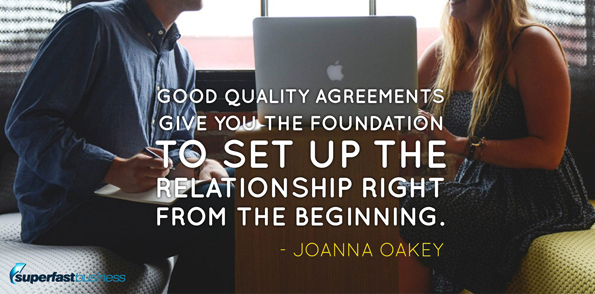 Joanna: Yeah, absolutely. So I see good quality key agreements as something that’s imperative to a business to help set the relationship between each of the key stakeholders in your business. So that might be your staff, your contractors, your suppliers, and importantly your clients as well. And business partners as well. So good quality key agreements give you the foundation to set up the relationship right from the beginning, and to help set the expectation between the parties so everyone knows what to expect, which then reduces the likelihood of arguments down the track.
Joanna: Yeah, absolutely. So I see good quality key agreements as something that’s imperative to a business to help set the relationship between each of the key stakeholders in your business. So that might be your staff, your contractors, your suppliers, and importantly your clients as well. And business partners as well. So good quality key agreements give you the foundation to set up the relationship right from the beginning, and to help set the expectation between the parties so everyone knows what to expect, which then reduces the likelihood of arguments down the track.
James: How often do agreements need to be called upon?
Joanna: Yeah, well it depends how you view agreements. So I think I mentioned in the last episode that my driving belief is that agreements are not about just creating something boring on a piece of paper that is signed and then put in the bottom shelf. And if you adopt the philosophy that agreements are only there to drag out when something bad happens, then I guess you only need to refer to them if something’s going wrong.
But in the reverse, I like to look at agreements as helping to pave the way for how we’re conducting our relationship as a whole. So therefore, it’s not necessarily something that you refer to on a daily basis, but the principles that you’ve included in that agreement are something that will be living in your business on a daily basis.
The agreements you should have
James: Right. So I’m really interested in what are the key agreements. If we were going to have a checklist, if you walked into a business that already exists, say a business that someone listening to this podcast might have, what would be on your checklist to say, right, I’d like to see these following agreements?
Joanna: Yeah. I’d start off by saying the first thing that I want to see is if you have end customers, which most businesses do, I want to see those agreements. So I want to see, what is protecting you, and how you have set up your relationship with your clients or end customers. So that’s the first type of document that I would generally want to see.
Then the second document is your relationship with your staff members, be that employees or contractors or a mix of both, I want to see how you interact and set up your relationship internally in relation to those types of systems that drive the business through your people.
Thirdly, I’d want to see your supplier agreements. So how have you protected yourself in relation to the money that your business is spending? So it’s not just about the money that’s coming in, it’s also about the money that’s going out and what risks are tied up in that.
And then fourthly, business partner agreements. So what agreements do you have with any partners either inside your business or external to your business? And when I say external to your business, here I might be referring to relationships like referral relationships or other types of business partner interaction type of agreements. Or you know, if you’ve got internal partners, I’d want to see those as well. How is it that you have set out the agreement internally in relation to how decision making and profit and other economic factors work within the business?
On online terms and privacy
James: Nice. And somewhere in there, I think we were talking about privacy and terms of use for particularly online businesses.
Joanna: Yeah.
James: Like, we may not necessarily have a formal client agreement if we’re selling a product from a website, but certainly it would be covered somewhere, hopefully, in the terms and conditions, is that right?
Joanna: Yeah. So for me, I see those sorts of documents as a client-facing agreement. So for me, that all sits in the bucket of client agreements. But you’re absolutely right, people may not realize that that’s essentially what they are. So anything that relates to your business and anyone who’s engaging with your business, even if they’re not spending on your business right at this point, is an important area to make sure that you’re clear.
For example, in your terms and conditions on your website, you might use that as an opportunity as the place for you to be clear about, say, intellectual property ownership, or your rights or protections against the way that people are using your website, if they’re able to, you know, post information on your website, or if they’re somehow interacting with your website, whether they buy from you or not. If they’re buying from you, then there should certainly be a lot of terms to protect you and to protect them so that each of you know what to expect out of that relationship.
And then privacy, as you mentioned, is another really important thing to cover off. In Australia, we have a fairly new privacy regime that many businesses may be caught by, and they may not realize that they’re caught by it. So this is one of the areas, when you get up to the privacy policy on your website, and you should have a privacy policy on your website, you have to be really careful with this sort of policy, because this is the type of thing that businesses quite often cut and paste from someone else.
“Make sure that your privacy policy is appropriate for your business.”
And in Australia and definitely in other jurisdictions around the world, privacy can mean different things to different businesses. So you just need to make sure that your privacy policy is appropriate for your business, and that you’re not creating extra issues for your business by having something that’s inappropriate.
Can I use your terms and conditions?
James: Probably when a lot of people start out, they do go and cut and paste from some other website.
Joanna: Yeah.
James: I often get people contacting our helpdesk, saying, do we mind if they just use our terms of use and privacy and disclaimer? What would you say about that?
Joanna: Yeah. I mean, it’s a ridiculously risky thing for them to be doing, because they’re using these terms without understanding what the drivers are in your business that have created the terms to be set up the way they are. Each business is somewhat different, and if they’re just looking to take someone else’s terms, they clearly haven’t gone through the process of number one, understanding what’s appropriate for their type of business, based on where their business is based, based on who their particular types of clients are, and the particular realities of what risk is in their business and how to deal with that risk.
James: Yeah. I mean, when I started out, I asked a friend if I could get going with some wording, and at some point I engaged the service of a legal professional to clean up my website. And it was only recently. But that being said, my business is an Australian business. It’d be very different for a North American business, I imagine.
Joanna: Absolutely, yeah.
James: I had probably very different types of services. Like at the time I had the SEO services, we have the online forum, of course, and there’s a lot of things around that that people may not be aware of. For example, if you do happen to have a membership community, you have to have a policy around what people post in there. You know, who owns the content, what if they leave, can they ask for it to be removed? These sort of things are total gray areas unless you clarify them, right?
Joanna: Absolutely. And who’s responsible for content if something, you know, is creating risk? So it’s really important that all of these things are covered in an agreement that’s appropriate to your business, because you’ll find that those sorts of agreements will be completely different to the types of agreements that will be appropriate to your SEO business, or your website development business, because all of those types of businesses involve different types of risk that need to be dealt with differently.
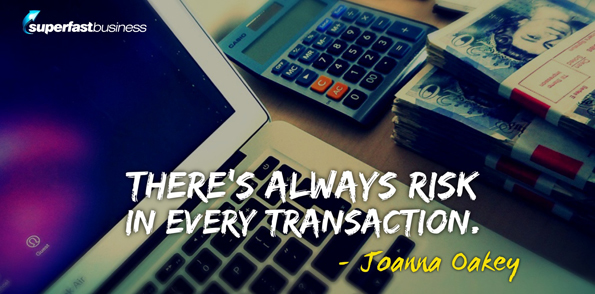 So they all deal with different types of intellectual property, and intellectual property protection. They all deal with different types of expectations between each of the parties, and they deal with different ways of sharing risk between the parties. Because every agreement is a way that parties essentially are sharing risk. Because there’s always risk in every transaction, and so this document sits there to help negotiate how that risk is shared between each party.
So they all deal with different types of intellectual property, and intellectual property protection. They all deal with different types of expectations between each of the parties, and they deal with different ways of sharing risk between the parties. Because every agreement is a way that parties essentially are sharing risk. Because there’s always risk in every transaction, and so this document sits there to help negotiate how that risk is shared between each party.
Agreements and affiliate marketing
James: And I think for a lot of people who might be doing affiliate marketing or selling products as we do, I carry a pretty full disclaimer as well to let people know, hey, we get products for free, we make commission on things. In other words, this site is definitely biased. If you were wondering, it’s not a completely independent journalist’s affair here. It’s a pretty biased website that has a purpose. But that being said, we still align my own values to give the customer tremendous value. But it’s always worth spelling out if you’re going to be earning a commission, because there are regulatory bodies who are now starting to get a little bit interested in advertorials and shrouded advertising. So it’s probably better to be as upfront as you possibly can.
Joanna: Absolutely. Look, the misleading and deceptive conduct rules in Australia are really broad, so it’s quite easy to be caught under the umbrella of an allegation that you’re not conducting your business in a fully transparent way, and therefore misleading or deceptive in some way, even if you had no intention to act in that way. That’s why these terms and conditions really help to protect you against any suggestions that you’re acting in a way that’s misleading or not fully transparent.
And actually, this whole area raises another issue in relation to businesses that have affiliate income that drives their business. It’s what are your agreements in relation to your affiliates? What does that look like? Because I think many businesses may not realize that the extent that they’re reliant on affiliate income can be both positive for their business but a negative if that rug is pulled from under them at some stage. So it’s important for them to understand those agreements.
James: I’ve had the rug pulled from me a few times as an affiliate marketer in the last decade, and most of it very early on, just because I didn’t fully understand the terms and conditions. They have extraordinarily long copy, they’re extremely difficult to understand, especially the bigger corporates or the enterprise ones. I think one of them didn’t like that I used a variation of their name in the domain name, which was very common a decade ago for affiliate marketers. I’ve learned my lesson.
Joanna: [laughs]
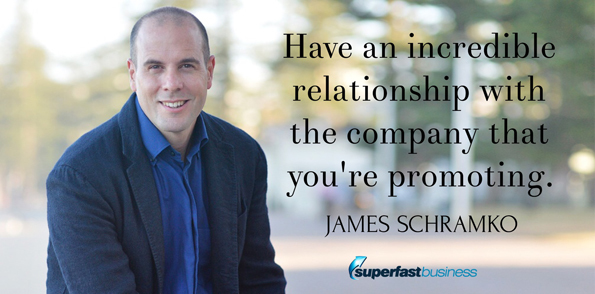 James: They closed my account. But you haven’t lived till you’ve been banned from an affiliate program. The thing is, you do have to read it. That’s what I tell people who want to be an affiliate. Have incredible relationships with the company that you’re promoting. A lot of them will forbid you from bidding on their keywords in paid traffic, some of them are fussy about you using their keywords even in metadata. It’s fascinating how much control they want to take.
James: They closed my account. But you haven’t lived till you’ve been banned from an affiliate program. The thing is, you do have to read it. That’s what I tell people who want to be an affiliate. Have incredible relationships with the company that you’re promoting. A lot of them will forbid you from bidding on their keywords in paid traffic, some of them are fussy about you using their keywords even in metadata. It’s fascinating how much control they want to take.
And I totally understand, having stopped my affiliate program mostly because of bandits distorting and manipulating my brand. And you can get into trouble if your affiliates are misrepresenting your brand as a commissioned agent. So that’s a huge risk that I wasn’t prepared to take.
Taking terms seriously
Joanna: Yeah, yeah. And I really think it’s about, you know, as you say, some of these agreements are long and complex, but it’s about understanding what they mean and not simply saying, “Oh look, there’s a four-page agreement or five-page, whatever, I can’t be bothered reading that, let’s move on to the next thing.” Because if it’s something that is important to your business or holds a level of risk, then you need to at least understand how it operates. And it’s not enough to say, that looks complex so I won’t worry about it. You know, it’s important that you understand what you’re entering into.
James: I think that’s important even in general, like whether you’re going to a go-cart track or hiring a photographer for an event, that there may be little weasel clauses in there that you want to put a line through. And I’ve found myself doing that now that I’ve educated myself around this.
I put a line through a clause recently for, it was just a photographer for a particular event that I was running, and one clause in there said they own the media and they can use it any way they want for promoting their own business and socially and on their website. I’m like, actually no, you can’t, because that’s not why I’m recording this event. It’s not for public publishing, it’s for me to publish. So I put a line through that clause, and they were OK with it, but I suppose sometimes people want things a little too much in their favor, and we have to guard ourselves against that.
Joanna: Absolutely. And I think it’s only when you become, number one, a little bit more savvy about understanding what these contracts actually mean, or what some of these clauses mean, and number two, a little bit more confident that you have the ability to change these agreements. And the reality is, I change agreements all the time, and I rarely get pushed back. I do exactly what you do. I strike through clauses that aren’t representative of what I want them to be, and I rarely get pushed back when I’m doing that more in a personal capacity.
But I think the final reason why people don’t usually make the changes is because they don’t really believe in risk in these sorts of contracts. And it’s only when people who’ve been in business for long enough that they really understand that sometimes these clauses bite, and can bite hard, just as your example of you know, having the rug pulled out from under you in your affiliate commissions. It’s only when things like that happen a few times that people suddenly seem to become a bit more serious about understanding what they’re engaging into.
Agreements in partnership
James: Well, I’ve been around in business long enough to have seen incredible disputes, which we’ll cover in a sec. But the most interesting one probably was when the two owners of the business I worked for went into a full-scale atomic war, and one of them allegedly sleeping in a borrowed car on the Central Coast, the other one ended up with pretty much everything. But it was heavy, and it was deep, and I’ve seen what can happen, and I’m especially wary of partnerships, so I can see why you’ve put partnership agreements on the list there.
Maybe we should talk about things that could help a partnership agreement. I often talk about the partner tax, I’ve used a case study before where I vested too much equity with a partner who wasn’t bringing enough value to the table to sustain the deal. It was like a 50/50 deal, but I was doing like the 90 percent of the work, like bringing all the customers and fulfilling. And in the end, I had to exit that partnership just because it didn’t make sense commercially. As it turned out, I made offers to buy the other half, I suggested that we adjust the split to reflect reality. These were sort of met with no real reaction. In the end, I had to just start a new business, and turns out most of my customers migrated across. So it was the most difficult way of doing it.
But let’s talk about things like the shotgun clause we often hear about.
Joanna: Yeah. Look, there’s lots of clauses that you can build into agreements to assist you at the point where you’re no longer getting on. So the shotgun clause operates so that one party then has the ability to make an offer to buy out the other person, and then if they don’t then the other person is forced to buy them out. Or it can be many other derivatives of that. But that’s essentially the concept. It’s forcing the position where something has to happen in relation to the shares or the ownership of the business.
But I think the real question is, how do we set this up from the beginning to try and avoid those arguments later on down the track? And I think part of that comes to, how are we going to make decisions, what is the expectation that we each have of each other, and what’s the review periods that we’re going to build into this agreement, and what are we going to do at those review periods if things aren’t going along in the way that we want?
So there’s lots of mechanisms that we can use. There’s lots of funky things in shareholders agreements called drag along clauses, tag along clauses, as you said, shotgun clauses. There’s lots of dispute resolution mechanisms. But at base, I think it’s all about building in review periods, periods where you’ve already pre-agreed that you’re going to come together, look at what each of you are bringing, and re-formulate where you’re going from there and what the business moving forward looks like.
And so in those sorts of situations, you have to be careful about restraint clauses that might be in these agreements. So often in business partner agreements, there’s a question as to whether or not to include a restraint clause. So a restraint clause essentially says that during the period of time that you’re in business together, you can’t be doing anything in competition with the business or you can’t take any client or those sorts of things. So that’s one type of restraint. But then often, there’ll be a restraint clause that’s built in that relates to what happens after you’ve terminated your relationship. And that can be quite a dangerous sort of clause in these sorts of agreements.
So sometimes, it’s a relevant clause to have there, but sometimes it’s just downright dangerous, particularly if you don’t hold control of the business, and effectively if you own any less than 51 percent, you don’t control the business, unless you have some other means of controlling it. But generally, in 50/50 relationships or if you have less than a 50 percent ownership, where you don’t control the business, you want to be really super careful about any restraints that might operate after termination. Because you might be restrained from going out and setting up again yourself in a particular area. So that’s something that I particularly look out for.
James: Right. Yeah, well that’s definitely something that came up for me when I was selling my business, and it was to be expected, too, that someone paying good money for an asset that’s income producing probably doesn’t want you to go and set up shop with the exact same thing next week.
Joanna: Yeah. But it can be a massive issue if you don’t have the right mechanisms to get out of the agreement, and you are still bound by these restraints. Or you do have the mechanisms to get out but the restraints exist post-termination for a period of time.
Covered so far
James: Right. So just a quick review here. We’ve talked about client agreements, and we’re pretty clear, for a lot of us that will be at some kind of a check box on an order or privacy or terms or what have you, if it’s fully electronic. Staff agreements, we sort of touched on staffing a bit in Episode 1, but it’s obvious that you should have a staffing agreement. A couple of reasons for that one.
A few that I’m aware of firstly, you might need it for your insurance policy, especially if you’re doing websites or anything developy, an insurance company on an IT-type policy, they’d like to know that you have a contract or agreement that if a staff member does something bad, then you would want to be covered from any risk that you have with your end customer but also that you might want to be able to retrieve or remedy from the staff member who’s wronged you. It’s also good for the staff member to know what their actual job is and how much they’ll get paid, it would help them get a loan, home loan or something because they’re going to probably need an employment document of some kind in many cases.
And if you’re Australian and you’re an export marketer, it can also assist you if you have contractors and an agreement, it might assist you with your export marketing assistance from Austrade, if that’s something that you’re interested in. We certainly talk about that a lot inside the SuperFastBusiness membership.
And I can understand why you want an agreement with suppliers. Maybe you don’t want them supplying your direct competitor, or maybe you get an exclusive, or maybe you’ve got to factor your accounting around a particular supply cost over a certain period, or what if they don’t supply you with what you’ve ordered, what would happen then? These things come up for some of my e-commerce customers.
Joanna: And in services, if you’re purchasing services, because all businesses purchase services at some stage, whether or not that’s design, development, whatever, it’s about in those agreements being clear about what you’re receiving as well. So I think that’s another thing to be clear in supplier agreements. And often in supply agreements, there’ll be an element of intellectual property that you may need in your business, if you’re going to sell it in the future, to prove to buyers that you own all of the IP in your business. So that’s another thing to look out for in supplier agreements, I think.
James: Definitely, yes. It’s important to get that ownership. I think I sort of touched on that example before with the videography type thing.
In case of disputes
So with disputes, like if you’re starting to get signals that there’s a dispute on the horizon, how quickly do you lawyer up?
Joanna: Yeah. I think it’s extremely important to have a conversation with your lawyer very early on in the piece so you understand what the risks are that you’re generating at that point. I’ve had lots of instances of people that have been referred to us with disputes that they have tried to deal with on their own and that they’ve just managed to create a massive hole for themselves because of the things that they’ve said that now are on record that they can’t unsay.
So essentially, I think the point is, the quicker you get advice, it doesn’t necessarily mean that a lawyer needs to step in and take over negotiations immediately. But you should at least have the discussion with a lawyer as quickly as possible so you can at least understand what the risks are and what you should and shouldn’t be saying in a particular situation about what could make things better or worse.
James: Here’s a pattern I’ve seen play out more than a number of times. It’s like, the party start out with a little conversation, they realize they’re going down different paths, they then think “Let’s try and make an agreement”, then they innocently go off to their lawyer to get the agreement ratified, and then it just turns into a sh** storm. Like the lawyer gets all heavy on the wording, advises the person they could get so much more or that the deal should be stacked far more in their favor, and then it goes into loggerheads and court action and a lot of money spent.
I’ve seen this not once or twice but at least five or six times from people in my sphere where, I’m not trying to be completely mean against lawyers, but I guess part of it is that the lawyer is definitely going to have to educate the person as to their rights and entitlements and maybe sometimes, maybe, they water a bit of a greed gland, but other times, there seems to be some huge conflict where the lawyer actually might get paid more if they spend more time on a project or make it more complicated.
So what can we do as a consumer aside from talk about things like a fixed-price project or set certain limits to how much could be spent on lawyers in a contract or things like that?
Choosing the right lawyer
Joanna: Yeah look, I think this is a really interesting comment on the legal profession as a whole because I certainly see these personalities in other lawyers and sometimes in clients quite often. A typical lawyer profile of a lawyer that deals in disputes is a highly aggressive profile. And quite often, this is what wins over clients. So clients often like this initially because they think he’s someone really aggressive who’s going to get me what I want. But what they don’t realize is that when aggression meets aggression, which is quite often what happens from the lawyer-to-lawyer situation, you then have this fight off that ends up rising everyone’s temperatures basically and creating a situation where it’s really hard to get a good deal done that’s good for either party, other than, as it’s traditionally said, other than the lawyers who win it out in that instance.
“Principle often gets in the way when there’s too much emotion.”
So I really think that the best way through is by finding someone to represent you who is a good communicator and who is good at looking in a balanced way at each of the sides, because the only way you’re going to get the best deal is to understand what the other party wants and why, and to find a situation in which you can essentially make each party as happy as possible in the situation or create the environment where you can educate the other party in a non-emotive way about why it is that they’re wrong, and if it went to court, why they wouldn’t be successful, because people only continue arguing if they believe they’re right or if principle has gotten in the way. Principle often gets in the way when there’s too much emotion.
“Do you want to fight or do you want a good outcome?”
So it’s really about, I think the first thing is being clear about what you want before you go and seek advice. If you’re annoyed, sometimes, it can be really gratifying to speak to someone who seems to really be aggressive on your side. But I would suggest at that point, stepping back and just having a bit of a ‘think about the situation,’ and try and work out what you really want. Do you want to fight or do you want a good outcome at the end of the day? So it’s about making the decision about who you choose right at the beginning.
James: I like that. I’m sure there are some lawyers who just love a good fight, would love to take it to court and bill more hours.
Joanna: They do.
James: And I’m sure that it’s a lot to do with emotions when you’re dealing with wrong customers or people who feel like they’ve got the bad end of the stick. And certainly, in businesses, there are some people out there just looking to set up people for a fall. I’ll never forget this, I was recruiting at the Mercedes dealership for sales reps and one guy came in, and he was late, he was rude, he was evasive, he was ignoring the questions as well, he was shuffling papers, he was doing everything possible to be the worst candidate ever, and then he left. The owner of the business got this six-page review of our appalling recruitment process. It turns out he’s a recruitment expert wanting to sell us recruitment services. It was a complete set up.
Joanna: Oh my goodness!
James: Yeah. But there are people out there who are trying to slip on bananas and get a pay day right.
Joanna: Yes yes yes.
Getting into partnerships
James: There are so many elements that could happen here. It could be a misunderstanding, it could be that when the deal starts, it’s great. I see this happen a lot because I’m in a kind of an incubator environment in this forum that I have. We have hundreds and hundreds of members, and a very common one is, “I’m going to start a business. I’m going to go in a 50/50 deal with such and such,” and I think most of the time, it’s because they don’t want to be lonely. They want to know that someone else is secretly going to do all the work for them and fill in all the gaps that they have because they’ve got a lot of gaps when they start out.
It’s really common that these little partnerships are formed and then they don’t last very long at all. But even very strong partnerships, whether it’s Zuckerberg and Dustin in the beginning, they can quickly go down different paths because you know, life kicks in. People get married, they have relationships, they move countries, they have different tastes or preferences, or they get tired or what have you. It’s actually pretty uncommon that a partnership will go all the way like a Charlie Munger and Warren Buffett type partnership. It’s probably rarer than more common, right?
When emotion gets in the way
Joanna: Yes, yes, yes. Look, that’s absolutely true. And I’ve seen some spectacular explosions. Of course, when everyone starts a partnership, emotion is high, everyone thinks that it’s all going to go great right at the beginning because everyone’s on their best behavior. But it’s not until time goes on that, as you say, circumstances change or people spill further into who they actually are and that starts to grate against each other that the problems start to emerge.
And it can be one of two things as well. Great success in a business can drive wedges and create issues, and big problems in a business can also do the same thing. They’re almost the two, highest danger points. When things are going really well in the business or things are going really poorly in the business.
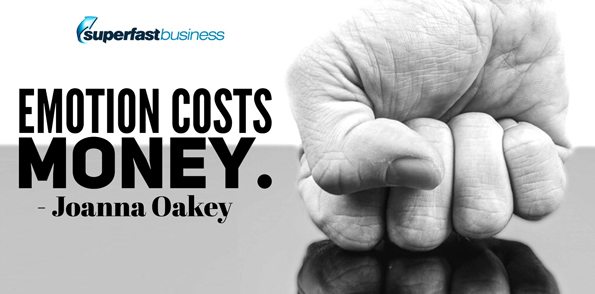 I think as with the whole subject of disputes we’ve been talking about, the longer they fester the worse they become, so you really need to jump on these things quickly by good, clear communication and by understanding what you’re doing so you’re not making things more difficult. But you need to try to deal without emotion because emotion costs money in these situations. Ideally, you need to have someone on your side who can help guide you in a way that helps take the emotion out of the situation. So you need to find professionals to work with who are helping strip out the emotion rather than adding in the emotion because emotion and principle cost time and they cost money.
I think as with the whole subject of disputes we’ve been talking about, the longer they fester the worse they become, so you really need to jump on these things quickly by good, clear communication and by understanding what you’re doing so you’re not making things more difficult. But you need to try to deal without emotion because emotion costs money in these situations. Ideally, you need to have someone on your side who can help guide you in a way that helps take the emotion out of the situation. So you need to find professionals to work with who are helping strip out the emotion rather than adding in the emotion because emotion and principle cost time and they cost money.
And then I think finally, you need to avoid the issue in the beginning by being thorough. You need to have the right agreements in place. You need to have strong forces. You need to understand your risk before you start so you’ve covered them off. And you can do that by I guess using a good checklist essentially to ask the right questions from the beginning.
James: I love how you talk, by the way, as one of the nice lawyer friends that I have. I like how you explain things clearly, and you are very matter of fact about it. In fact, you helped me with the dispute that I had with a supplier, a very minor one I might add, and it was fairly inconsequential in terms of monetary difference. But I’d felt that I’d been wronged, especially when I went out of my way to clarify all of the terms and conditions upfront, which were not onerous on the other side. They were just being a little bit rude almost, a bit greedy, and Joanna, you helped me fix that through a simple communication that managed to head off any further action and got me a full refund, which was wonderful. I never, ever normally ask for a refund on anything, but there was a specific situation that happened here where I anticipated this might be a possible outcome, and it was, and we sorted it out. So I do recommend your services if anyone’s interested. AspectLegal.com.au, if you’re in Australia.
Now one more topic in this episode – systems for cash flow, AKA, debt collection reduction. This one’s an interesting one. I’ve certainly spent a lot of time and energy in the past converting customers to getting paid upfront and reducing the need for them to have debt collection because they’re never really at the mercy of the customer. They haven’t been turned into a surrogate bank. Most of our customers are using Visa, or Mastercard, or Amex, or PayPal, or some other funding sources, and they’re paying us at least.
Of course we have to deliver, but we don’t have to charge as much because we don’t have all this hassle of follow up. But what if you are in an unfortunate situation of poor cash flow timing where you do the service and then get paid afterwards? I mean I really don’t like that as a business method, and still, some people stuck in that. So my first tip will be get out of it. But what sort of things can you do to improve cash flow?
How to improve your cash flow
Joanna: I think this is a super important point because often, this issue only becomes really clear when a business is either in difficult situation itself in terms of its own payments that it has to make or when it’s been through a period of quick growth. So quite often, I see the biggest cash flow issues come when a business least expects it because they’ve been going through a period of fast growth, which has increased the expenses that they’ve had. They’ve taken their eye off the ball in terms of the detail of the contract that they’re entering into and then suddenly, people stop paying or start paying slowly. And so once you have this situation with debtors trading outside or paying outside of their trading terms, you start reducing the cash flow that’s available to a business, and it can cause a massive cash crunch.
The issue with a business once you’ve got high overheads is sometimes, you can’t save yourself when this cash crunch occurs. And the cash crunch might be because people are paying slower or because a particularly large client or a number of clients have themselves suffered a cash crunch or have gone into insolvency. I’ve certainly seen so many businesses that have been growing quickly, suddenly had a number of clients start to become slow payers, or one large client becomes insolvent, a few others become slower payers. And then suddenly when they can’t make their own expenses, they have been forced into the liquidation or bankruptcy, even worse.
James: It happens a lot with tradies, doesn’t it, where they’re spending a lot on equipment and fitting out a whole building and then the builder doesn’t pay them?
Joanna: Yeah. But I’ve seen it happen in services businesses as well. So I’ve seen it happen in trades, certainly in construction, in construction supplies, but it can happen in almost any business that’s not getting paid upfront. So I’ve certainly seen it happen in even web development businesses, in design businesses, in marketing businesses. No industry is completely protected from this sort of issue happening. I think it’s really important, number one, that businesses understand this is a risk, because the risks are real. You could be talking about losing your entire business if you’re not ensuring that cash flow is continuing through the business.
So you need to be training your clients well, you need to be ensuring that you and your clients run the same page in relation to expectations between each other because sometimes what can drive this sort of cash crunch comes from a number of clients that when a business grows, initially you’re quite close to clients and the delivery to clients. As a business grows, you may become further away from the delivery to clients. The quality might drop or those initial discussions about the expectations about what clients will provide you, what you’ll provide them sort of breaks down a little bit from the personal relationship you used to have.
“When clients are upset, they stop paying.”
Clients get upset. When clients are upset, they stop paying or they pay slowly. That’s just what happens. So you need to make sure you set up the relationship with your clients right from the beginning. So that’s the first thing. You need to make sure as you grow, your systems grow at the same speed so that your quality isn’t being impacted by the growth of your business. And you need to make sure your clients are trained well in payment.
Often, smaller businesses have a closer personal relationship with clients. So clients will pay if you drop them an email to say “You’re a bit late.” But as you get bigger, clients seem to have less of a personal connection and therefore less of a drive to pay on time. So it’s really a case of training your clients well as you go through these growth phases of the business.
Other things to look out for
James: I think there are also other things too like not letting one customer take more than a quarter of your business for example.
Joanna: Yup, yup, yup. Absolutely.
“Either get a bigger boat or a smaller fish.”
James: I call that the big fish. It’s like the little fisherman in a row boat hooking up like a six-meter shark. It’s going to tip the boat and the shark might eat them as well. You’re just not going to land it. So basically, either get a bigger boat or you need to get a smaller fish. So have lots of smaller customers or build a bigger business where that customer is still only a small percentage of your business.
Joanna: Yup. And make sure with any large clients that you’re watching them closely in terms of payment times because what quite often happens with businesses that have cash flow issues is you’ll start to see their trading terms slowly creep out. And then another behavior to look out for is businesses that pay rather than actual invoices that pay round figures. So partial invoice payments. That’s another often indicator of a party you’re dealing with having some sort of cash flow issues themselves.
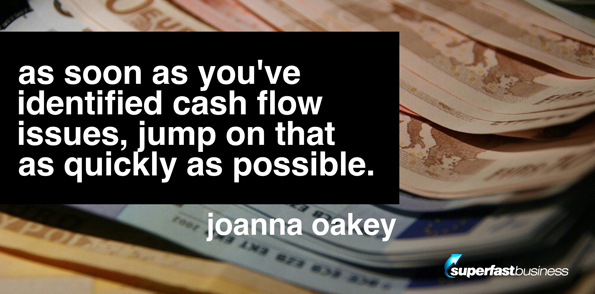 And as soon as you’ve identified that someone is having cash flow issues, it’s important to jump on that as quickly as possible, firstly because the squeaky wheel gets paid first. But sometimes, you can also be of help to businesses at that point. And people are forever grateful if you’ve been helpful to them in a time of need. But you’re not being helpful by sitting there and saying nothing. You need to communicate.
And as soon as you’ve identified that someone is having cash flow issues, it’s important to jump on that as quickly as possible, firstly because the squeaky wheel gets paid first. But sometimes, you can also be of help to businesses at that point. And people are forever grateful if you’ve been helpful to them in a time of need. But you’re not being helpful by sitting there and saying nothing. You need to communicate.
Communication is key
James: That’s great advice. This subject is so close to my heart. My first office job, my first full-time office job was as a trainee account manager debt collector in the city, phoning up people, asking them for their overdue bills that had been handed to a debt collection agency. So they’d already gone from say a service center or a shop and they couldn’t get the money so they handed it to the debt collection agency. We used to do the process of the telephone call, then there was a statement of liquidated claim, and then we’d garnish wages and send around the sheriff. I mean this was all real stuff. And then I graduated from that role into telephone collections for the car company with GMAC finance, and then I went out into the field and did repossessions. I was collecting money.
But you’re absolutely right. Helping people be more resourceful, when they’re not very resourceful, is a good thing to do for another human to help them manage themselves out of a situation. I often used to have to explain what dominoes are coming down the track. So for example, I’ll be standing there with a factory worker explaining that he really should do whatever he can to make that last payment on that vehicle because if the vehicle is picked up and taken away for storage, which is the nice way we used to say for repoed. Just a side note, we actually got training on these cassettes that were from America, like they were probably made in the 60’s or something, and I swear to God, sitting in the training room, put the little cassette into those portable cassette players, hit play, and it says in this thick American accent, “Avoid using terms like putting it in the barn.” Because I was going to say that the next time I go out and repossess someone’s car. “Sir, we’re going to have to put your vehicle in the barn.” [laughs]
Anyway, the reason I left that company in the end, it was just out of touch. It was so out of touch. The forms were from 1967. Really old school dinosaur company. But anyway, the thing is, helping people understand that by doing something now, they can avoid a bigger problem later. But in a nice way, and not because you’ve got the big stick and you’re forcing them, it’s only when they react and went all nasty that I would have to resort to stealing their car when they’re not looking to avoid the dilemma. And I found it so much easier to get the payment after I took the car.
Joanna: [laughs] Well look, and therein lies another point, isn’t it? It’s always good if you can find a way to reserve a bit of power in your situation if you have any. That can often be the leverage that will help a business. But you’re not doing anyone any service by letting cash flow get to a point, letting debtors get to a point where they’re crippling your business because then you won’t be able to provide services to anyone.
Get paid first
James: It’s just not responsible for you. So just a couple of points to clean that one up is get paid first. Even if your industry is one of those industries where everyone’s on credit or delayed payments, it doesn’t mean you have to go down that path. I watched Vodafone start signing people up for 12-month contracts for a mobile phone. That was unheard of back in the days of Hutchison Telecommunications, and Optis, and Telstra. Vodafone changed the game on how phones are sold in Australia. Thank goodness, it’s gotten back to a point where you don’t always have to do a contract, but you can change your industry.
Read a book like Simplify and learn about being a proposition simplifier. Maybe a customer would like to go on a recurring subscription plan instead of having adhoc billings. So if you listen to the podcast on SuperFastBusiness.com that I did with John Warrillow about the Automatic Customer, it’s a great way of transforming. I also did one with Robbie Baxter. Even if you’re a florist, instead of supplying shops and then sending them a bill that they hopefully pay, you can put them on a recurring subscription where you just constantly go and update their office flowers. There are so many great examples of flipping the game on its head. Getting paid upfront if you possibly can.
Reduce the amount that you let someone buy from you. If they’re starting to encroach on 30, 40, 50 percent of your business and something happens to them, you could be in great trouble. So it’s a sign to watch. You gave some good tips. Watch out for how slowly people are starting to pay.
In the telephone collections area, we used to track the delinquency, the number of accounts over 30 days, 60 days, 90 days, and if that was blowing out, then we knew that there was a challenge or a problem coming, and we’d put more resource. Our metric was to get the number of accounts over 30 days to the lowest possible.
Now a service business tip, I know this well from having a subscription business, a subscription service business, one of the key metrics that we looked for in our business was making sure we delivered the work within 30 days. And often, the biggest impediment to that is obviously the customer. If you could believe this, some customers would order SEO and not tell us which website they wanted us to rank. So we knew if we couldn’t deliver the service within 30 days that they’re not going to renew. It’s only a matter of time until the payments pile up and they ask us to stop, or even worse, they pile it up, never give us the stuff, and they do a chargeback. I mean that’s happened a couple of times in seven years, and that’s really offensive. It puts a black strike on your credit card provider, and it was through no fault of your own.
Going beyond just getting paid upfront or whatever, do everything you possibly can to help your customer get a great result so that they are funded to be able to pay you regardless of the payment timing. I think that’s a nice sort of end point to this.
Joanna: Absolutely.
James: In this episode, we’ve talked about the key agreements; about the client agreement, the staff agreement, the suppliers agreement, the partners agreement, the privacy and terms of use and income disclosures, dispute resolution, contracts, making sure that you’re getting on well with everyone. We’ve talked about how to hire a lawyer and not cost yourself a fortune. We’ve even made a suggestion where you might go if you’re in Australia. And we talked about systems for cash flow and debt collection. Joanna, this has been an action-packed episode.
Joanna: Thanks James. I’ve had fun. Hopefully, it’s been interesting to listen to too.
James: Right. Well, there’s a full transcription available at SuperFastBusiness.com. Look for Are You Legal? Part 2 of 3: Key Agreements. Joanna can be found at AspectLegal.com.au. She has a Talking Law podcast. So if you liked this stuff, if you want to get all legalized, educate yourself, TalkingLaw.com.au, I think the podcast is at. Yes?
Joanna: It is. That’s it. Absolutely.
James: Yup. Educate yourself about stuff. The more you can learn about it, the more you’ll probably save throughout the course of your business career, avoid stepping on the minefields, etc.
Joanna: Absolutely.
James: So until next time, where we’ll be talking about building your business to sell, which is going to be a nice way to end this three-part series. If you’ve enjoyed this episode, please leave a review at iTunes. We really appreciate that. I don’t have too many because I never really ask. I certainly read them all. Thank you so much and until next time. Have a great time. Thanks, Joanna.
Joanna: Thanks, James.
Learn how to build team directly from James LIVE – Click HERE
Take Aspect Legal’s free 5 minute Business Risk Assessment
Stay up to date with episodes by subscribing on iTunes

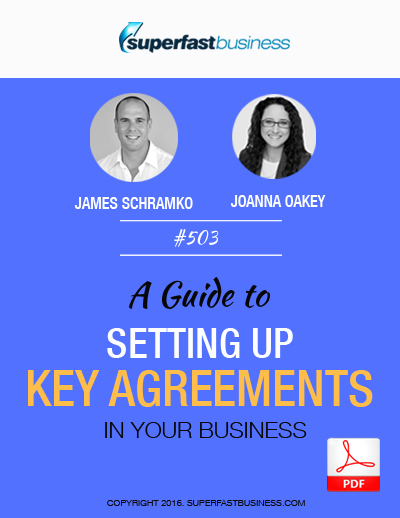









Leave a Reply